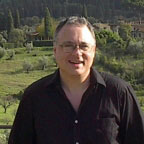Behind the News with Doug Henwood

The latest episode features Gary Weiss on Ayn Rand, and Adolph Reed on Black History Month.
Etiquetas: Ayn Rand, Doug Henwood, eng, Henwood, Podcast
Blogueando desde marzo de 2004 / Blogging since March 2004. Creador también de The World According to Carmelo: carmeloruiz.tumblr.com. Contacto: ruiz@tutanota.com. Twitter: @carmeloruiz

Etiquetas: Ayn Rand, Doug Henwood, eng, Henwood, Podcast
Etiquetas: esp, Las Otras Noticias, Stratfor, Wikileaks
Etiquetas: Biotech, eng, English Video, Monsanto, Video
Etiquetas: esp, Frente Socialista, Puerto Rico
One of the fastest-growing online businesses is the business of spying on Internet users. Using sophisticated software that tracks people's online movements through the Web, companies collect the information and sell it to advertisers.
Every time you click a link, fill out a form or visit a website, advertisers are working to collect personal information about you, says Joseph Turow, a professor at the Annenberg School for Communication at the University of Pennsylvania. They then target ads to you based on that information.
On Wednesday's Fresh Air, Turow — the author of the book The Daily You: How the New Advertising Industry is Defining Your Identity and Your Worth — details how companies are tracking people through their computers and cellphones in order to personalize the ads they see.
Turow tells Fresh Air's Terry Gross that tracking is ubiquitous across the Internet, from search engines to online retailers and even greeting card companies. A recent Valentine's Day card sent to his wife, for instance, contained trackers from 15 separate companies. 
"[Advertisers] might make inferences about me and romance, they might make inferences — right or wrong — about my age, they might know where I did this — because of some sense of where my computer is, my IP address," he says. "There are a lot of things they can infer about me even from [a greeting card]."
But advertisers are not just limited to tracking your Internet browsing, says Turow. They're also trying to connect what you do on phones and other mobile devices, which are typically tied to an individual user and account.
"In the holy grail vision of this," says Turow, "the idea of what you do on mobile should be connected to what you do on the Internet, and what you do on the Internet should be connected to what you do on your iPad, and eventually all of this will converge on what you watch on television."
But right now, says Turow, advertisers are still in the beginning stages of tracking users. He says he still receives ads for dating sites — despite being happily married.
"We're at the beginning of this new world," he says. "It's like the beginning of the airplane industry. Things screw up, and yet we have to look down the line because we're going to have Boeing 747s down the way."
Etiquetas: eng, Fresh Air, Joseph Turow, NPR, Podcast
LAS RAZONES DE LA MINERÍA : UNA ACTIVIDAD EN EXPANSION MUNDIAL POR CAMBIOS TECNOLOGICOS Y ECONOMICOS
Por José Natanson *
África, partes de Asia y América Latina viven con tensiones el boom extractivo, que cambió de métodos y alimenta un mercado voraz. De la mano de las inversiones llegan los conflictos políticos y medioambientales.
La minería atraviesa un período de auge mundial que se explica por varias razones. La primera son las innovaciones tecnológicas, que hoy permiten explotar minerales dispersos en áreas relativamente amplias, superando así el agotamiento de la tradicional explotación de veta. La segunda es la escalada de precios resultante de la voracidad de algunos países emergentes en procesos de intensa industrialización, en particular China, que hoy consume el 46 por ciento del acero, el 40 por ciento del cobre y el 50 por ciento del carbón que se produce en el mundo, lo que la ha convertido en lo que los economistas, esos virtuosos del lenguaje, definen como un monopsonio (un actor económico que logra controlar el mercado por su capacidad de consumo, algo así como un monopolio de la demanda). Además, la debacle de los mercados financieros convencionales disparada por la crisis mundial de 2008-2011 llevó a muchos especuladores a refugiarse en las materias primas, lo que también contribuyó a aumentar sus precios.
Junto con Africa y algunas zonas de Asia, América del Sur es una de las regiones más ricas en minerales del planeta. En los últimos años, casi todos los países han visto una expansión acelerada de la actividad. En Brasil, por ejemplo, la producción de bauxita pasó de 19,3 millones de toneladas en 2003 a 29 millones en 2010, mientras que la de hierro creció de 263,7 a 370 millones de toneladas. En Perú, que hoy lidera el ranking minero de la región, las exportaciones totales registraron en 2011 el record de 45.726 millones de dólares, lo que representó un incremento de 28 por ciento en comparación al año anterior: de ellas, el 58 por ciento son minerales. Las exportaciones mineras provenientes del Mercosur ampliado pasaron de 13 mil millones de dólares en 2003 a 42 mil millones en 2009 (todos datos de la Cepal).
El investigador uruguayo Eduardo Gudynas, muy crítico con el auge de la minería y las condiciones sociales y ambientales en las que se desarrolla, distingue sin embargo diferentes realidades (“Estado compensador y nuevos extractivismos”, revista Nueva Sociedad Nº 237).
Para Gudynas, países como Perú y Colombia practican un extractivismo clásico, en el cual las empresas trasnacionales de-sempeñan un rol centralísimo, con escasos o nulos controles estatales, mientras que otros países han intentado esquemas más o menos articulados, más o menos efectivos, que tienden a incrementar el papel regulador al Estado y aumentar los porcentajes de apropiación de la renta minera, ya sea mediante la creación de joint ventures (contratos de riesgo compartido) entre empresas nacionales y extranjeras, como en Bolivia, donde la Korea Resource se asoció con la Corporación Minera, sea a través de la creación de empresas estatales, como en Catamarca o Santa Cruz, o vía la imposición de nuevos tributos, como las retenciones argentinas o ecuatorianas.
Etiquetas: esp, Extractivismo, Gudynas, Minería


A girl carrying water in Kibera slum, Nairobi. There is sometimes a clash between environmental policies and social justice. Photograph: Simon Maina/AFP/Getty Images

La necedad de quemar el planeta para subsanar todo lo que las empresas atropellan se documenta en este número que dedica un portafolio a las falacias de la economía verde. También se muestran las razones para defender a los pueblos del maíz en México y el continente, la urgencia de frenar el acaparamiento de tierras expresada por GRAIN en Estocolmo y los efectos tremendos de la contaminación transgénica sobre el quehacer de los apicultores. El número se completa con más casos de la resistencia a las mineras y noticias de la sabiduría de los pueblos.
http://www.grain.org/es/article/categories/493
Editorial
http://www.grain.org/es/article/entries/4463
Crisis climática y biomasa: una discusión urgente: La naturaleza en el horno
http://www.grain.org/es/article/entries/4464
Alimento y cultura ancestral en la Altillanura colombiana
http://www.grain.org/es/article/entries/4468
Premio Right Livelihood 2011
Discurso de aceptación de GRAIN, 5 de diciembre 2011: Es tiempo de repudiar a los acaparadores de tierra
http://www.grain.org/es/article/entries/4469
Mayo-yoremes de Sonora México:
El pensamiento y sus afinidades
http://www.grain.org/es/article/entries/4470
Las razones del maíz
http://www.grain.org/es/article/entries/4471
Ataques, políticas, resistencia, relatos
Nuevo set de datos sobre acaparamiento de tierras |Brasil: trasvase del río San Francisco | Transgénicos contra la apicultura | La primavera silenciosa en el sureste mexicano | Defendamos nuestro maíz nativo y criollo, sus usos, ritos y prácticas asociadas. Apoyen el pedido de declarar al maíz patrimonio cultural de la humanidad | No existe soberanía alimentaria sin biodiversidad | RENACE repudia el asesinato de Cristián Ferreyra, miembro del Mocase Vía Campesina | Perú: La contradicción entre UPOV y una moratoria a los transgénicos | Argentina: Fragmento de la sentencia emitida por el Tribunal Ético en el Juicio Ético Popular contra las Transnacionales
http://www.grain.org/es/article/entries/4472
De un vistazo y muchas aristas
Despanzurrar el mundo con fines de lucro
http://www.grain.org/es/article/entries/4473
Etiquetas: esp, Revista Biodiversidad
Etiquetas: Earth Beat, eng, Podcast, Radio Netherlands

The Brits: You've got to hand it to them. The Empire may be long gone, but they still reign supreme when it comes to effortlessly exuding mordant wit. For anyone who savors the acerbic literary likes of Evelyn Waugh or the Amises, father and son, Helen Simpson is just the ticket.
Her latest short-story collection, In-Flight Entertainment, has already been lauded by reviewers across the pond: The Times of London declared that it was "dangerously close to perfection." The stories assembled here are filled with crisp observations about mortality, infidelity and the looming apocalypse of climate change. Melancholy subjects, to be sure, and Simpson accords them their emotional weight; but one suspects that even as the ice caps melt, Simpson's hardy strain of Brit wit might well be wheezing out a rueful quip or two.

Helen Simpson is also the author of the short-story collections Getting a Life, Four Bare Legs in a Bed and Dear George.
Etiquetas: eng, Fresh Air, Helen Simpson, Maureen Corrigan, NPR, Podcast

Bob McChesney is a research professor in the Institute of Communications Research and the Graduate School of Information and Library Science at the University of Illinois at Urbana-Champaign. "The media are central to all our lives," he says. "Yet the media are the most frequently misunderstood parts of our lives. We want to help people understand the role of media in society."
Subscribe to the Media Matters podcast
Subscribe to the Media Matters weekly email newsletter
 In spite of soaring tuition costs, more and more students go to college every year. A bachelor’s degree is now required for entry into a growing number of professions. And some parents begin planning for the expense of sending their kids to college when they’re born. Almost everyone strives to go, but almost no one asks the fundamental question posed by Academically Adrift: Limited Learning on Higher Education: are undergraduates really learning anything once they get there?
In spite of soaring tuition costs, more and more students go to college every year. A bachelor’s degree is now required for entry into a growing number of professions. And some parents begin planning for the expense of sending their kids to college when they’re born. Almost everyone strives to go, but almost no one asks the fundamental question posed by Academically Adrift: Limited Learning on Higher Education: are undergraduates really learning anything once they get there?Etiquetas: Arum, eng, Media Matters, Podcast
Editor’s note: This is the third in a series of articles examining the history, activity, secrets and identity of the 1% in the US. See the previous two articles here and here.
Pierre S. du Pont II
President Roosevelt, however, responded differently to their attacks than President Obama. Here I discuss how, first by looking at a powerful family which, more than any other, led the attacks on FDR: the du Ponts of Delaware. They were the founders of the largest chemical company in the U.S.: E.I. du Pont de Nemours & Company, otherwise known simply as Du Pont. Keep in mind that they are not mere throwbacks to the 1930s. Ultra-conservative in their politics, and one of the richest families in America, the du Ponts were the primary financial backers of Newt Gingrich when he launched his “Contract with America” against President Clinton in the 1990s. As head of the du Pont-founded Government of the People Action Committee (GOPAC), Gingrich helped capture control of Congress for the Republicans in 1994 and propelled himself into the powerful seat of Speaker of the House – just a few heartbeats from his current goal, the White House. In 2005, one-time presidential hopeful and former Delaware governor Pierre S. du Pont IV, the founder of GOPAC, awarded Gingrich the “Pete du Pont Freedom Award.”
Introducing the du Ponts
The du Ponts are no average rich family. Since their arrival in America after fleeing revolutionary France as the aristocratic former Keepers of the King's Gunpowder, the du Ponts have long been among the worst examples of the 1%. Never having moved beyond industry to high finance, they never developed a sense of “nobles oblige” toward the 99% like the more enlightened Rockefellers, who not only used their oil industry profits to move into banking, but also favored liberal reforms for working people, earning moderate-to-liberal Republicans the term “Rockefeller Republicans.” (Mit Romney is the latest incarnation of that category. His father, George Romney, former president of American Motors and governor of Michigan, was seen by many as a stalking horse candidate for New York Governor Nelson Rockefeller when he briefly entered the race for the 1968 Republican nomination against Richard Nixon.)
******
During his first two years in office, when he had a Democratic majority in both houses of Congress, he did not pursue investigations into charges of war crimes leveled at former President Bush and former Vice President Cheney for illegally authorizing torture in Afghanistan to obtain false confessions of Iraq’s alleged ties to 9/11. Using torture to obtain false confessions to get Congressional and popular support for the invasion of Iraq could have been subject to legal inquiry by both the Justice Department and Congress. But fear, not courage or the Constitution, triumphed. In fact, according to Christopher Edley, Dean of the UC Berkeley Law School and a high-ranking member of President-Elect Obama’s 2008 transition team, the mere fear of a military coup by the Pentagon’s powerful generals if Obama pursued war crimes in Iraq and Afghanistan was enough to convince the Obama team to dismiss any serious consideration of prosecution of the higher ups responsible for the torture policy. This was the origin of Obama’s famous refusal to pursue prosecution: “We need to look forward, as opposed to looking backwards.”
Now, with his presidency confronted by a serious Republican challenge by corporate raider Mitt Romney, it appears that President Obama is beginning to take the gloves off as election season heats up. He needs to, if he hopes to remobilize his disappointed voter base. But with Texas’s Rick Perry backing out of the Republican primaries and throwing his weight behind du-Pont-backed Newt Gingrich, we may be seeing a repeat of the 1930s, with just as much drama and intrigue.
Next: Did Roosevelt’s policies really work to end the Great Depression?
See previous articles:
Introducing The 1% and Their Target: The Middle Class
Secrets of the 1%: FDR’s Attempt to Reform the 1%’s Wall Street
© Gerard Colby.
Gerard Colby is the author of Du Pont: Behind The Nylon Curtain (Prentice Hall, 1974), Du Pont Dynasty (Lyle Stuart, 1984), and with Charlotte Dennett of THY WILL BE DONE, The Conquest of the Amazon: Nelson Rockefeller and Evangelism in the Age of Oil (HarperCollins, 2005). He was the lead contributor to Into the Buzzsaw: Leading Journalists Expose the Myth of a Free Press (ed. Kristina Borjesson), winner of the National Press Club’s first Arthur Kruse Award for Press Criticism. He has taught international economics, political science and the history of Latin American political economy at various colleges, has lectured throughout the U.S. and Brazil, and has done investigative journalism for national and local news services for over 30 years. From 2004 to 2009 he served as President of the National Writers Union, Local 1981 of the Technical, Office and Professional Division of the United Auto Workers.
Etiquetas: 1%, Dupont, eng, Gerard Colby
Jueves, 17 de febrero, de 2012
Durante el día de hoy viernes 17 de febrero, se llevó a cabo el tercer día de la Vista Judicial en Alzada ante la jueza Gladys González Segarra contra seis ciudadanos acusados de violar el nuevo Artículo 208A del Código Penal, conocido como la enmienda Tito Kayak. Los arrestados el 15 de diciembre de 2011 se manifestaban en una zona de servidumbre de paso de una de las entradas a los terrenos agrícolas donde la compañía extranjera Pattern Energy tiene planificado instalar 65 turbinas de viento, más altas que la Estatua de la Libertad, perturbando al menos 3,700 cuerdas del Valle Agrícola de Santa Isabel.
Los acusados, el Dr. Robinson Rodríguez Pérez, profesor de la Facultad de Ciencias Agrícolas del Recinto Universitario de Mayagüez (RUM), el agrónomo Raúl Mari Fernández, estudiante de posgrado en el Recinto de Río Piedras de la UPR, Rosemarie Vázquez Cruz, egresada del RUM, Javier Smith Torres, estudiante de Economía de dicha institución, Edwin Velázquez González, estudiante de la Facultad de Ciencias Agrícolas del RUM, y Luis O. García Mercado, activista, fueron declarados con causa para arresto en presencia del Presidente del Colegio de Abogado, el Lic. Osvaldo Toledo Martínez. Estos pagaron una fianza de 20$ y fueron citados para una vista preliminar al caso el día viernes 2 de marzo en el Tribunal de Ponce.
Siendo esta la primera vez en que se aplica el artículo 208-A del código penal, la fiscalía necesitó 8 testigos para encontrar causa por la interrupción de obras de construcción. Durante esta última vista en alzada 5 hombres y una mujer alguacil se presentaron en la sala del tribunal media hora antes de que la jueza les declarara con causa probable. Los arrestados acudieron a los predios de Pattern Energy para manifestarse y ejercer su derecho a libertad de expresión, especialmente cuando dicho proyecto comenzó sin consultoría, y sin celebrar vistas públicas con los santa isabelinos.
Esta decisión criminaliza el derecho a la libertad de expresión poniendo en juego el futuro de los derechos civiles de los puertorriqueños. Ante la decisión tomada por el Tribunal de Ponce, el Frente Rescate Agrícola exhorta al Pueblo a unirse a su lucha por la defensa de los terrenos agrícolas a lo largo y ancho del país, y a que acudan a la próxima vista preliminar al juicio.
El Frente de Rescate Agrícola (FRA), reafirma su compromiso de lucha para garantizar la seguridad alimentaria de todo el Pueblo de Puerto Rico. “Vamos a seguir luchando por que se honren las Reservas Agrícolas, y por que sean los mismos puertorriqueños los que manejen nuestros terrenos agrícolas” comentó uno de los arrestados.
Etiquetas: esp, Puerto Rico
Escrito por David Rivera López
Etiquetas: Agro, esp, Puerto Rico

Clockwise from top left: John Talabot, The 2 Bears, Grimes, VCMG.
NPR's Sami Yenigun and Otis Hart are back to talk beats, loops, drops and more with Bob Boilen. The latest electronic edition of All Songs Considered includes cuts from the new Grimes Burial, a Burnt Friedman remix of South African dance music and premieres from Claude VonStroke, Nina Kraviz and VCMG — a collaboration between two former bandmates in Depeche Mode. album, a surprise EP from
Also on the show: Hot Chip's Joe Goddard emerges with the side project The 2 Bears, and the mysterious Spanish producer John Talabot unveils his first proper album. Plus, Sami and Otis discuss the homegrown sounds coming out of San Francisco and explain the logic behind limited-edition releases.
Etiquetas: All Songs Considered, eng, Music, NPR